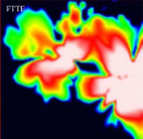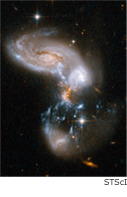Astronomy Program News & Events
see also: McDonald Observatory press room / archive
2008
Cosmological Radiative Transfer Comparison Project Workshop to be held December 8-10

2 December 2008
The third meeting of the Cosmological Radiative Transfer Comparison Project will be held December 8-10 at The University of Texas at Austin ACES building, room 2.402 [map]. The group was organized to guide and promote progress on the new frontier in computational cosmology. A recent explosion of astronomical discoveries about the Universe at large has led astronomers to describe our present time as the Golden Age of Cosmology. The recent data has borne out theoretical models once considered pure speculation. The Comparison Project has been working to incorporate radiation transport algorithms into simulations of cosmic structure formation and evolution.
Workshop Galaxy Evolution: Emerging Insights and Future Challenges to be held November 11-14

3 November 2008
The workshop Galaxy Evolution: Emerging Insights and Future Challenges will be held at the University of Texas at Austin Union Building (UNB) [map] Tues., Nov. 11 through Fri., Nov. 14. Many leading international researchers in the field of galaxy evolution will join an eclectic mix of 130 participants from 11 countries and 32 universities, experts with long experience, new researchers, and graduate students entering a field of expanding frontiers. Deep survey results from space and ground based observatories, and new predictive models of galaxy assembly will be among the topics discussed. The meeting is sponsored by the McDonald Observatory and Department of Astronomy Board of Visitors Excellence Fund.
Star Parties Far From Hollywood
Wall Street Journal feature by Willard Spiegelman
14 October 2008
Fort Davis, TX-- Everyone of a certain age or sensibility remembers the closing line of Warner Brothers' classic 1942 tearjerker "Now, Voyager." Standing by a large open window, Bette Davis says to Paul Henreid through a haze of cigarette smoke, "Oh, Jerry, don't let's ask for the moon; we already have the stars." Max Steiner's score swells; the camera pans to the heavens; the stars twinkle. The end. It couldn't happen that way now. Stoic and noble, Davis and Henreid have their parting rendezvous on Boston's Beacon Hill. Few, if any, stars would be available. Ninety percent of Americans, clustered in urban areas, mostly hugging the two coasts, cannot see the stars. We live in a world of light, or lights, 24 hours a day.
2008 Antoinette de Vaucouleurs Medal and Prize Awarded to Dr. Christopher McKee
1 October 2008
Distinguished American Physicist and Astronomer Dr. Christopher McKee, of the University of California, Berkeley, has been awarded the thirteenth Antoinette de Vaucouleurs Medal and Prize. The award recognizes a lifetime of outstanding dedication to astronomy. Dr. McKee's research has focused on the theory of the physical processes in the interstellar medium, the diffuse gas between stars, including its structure and dynamics. Currently, his work concentrates on the theory of star formation, including the first stars.
Astronomy Student Wins First Michael H. Granof Outstanding Graduate Student Award
15 May 2008
Astronomy graduate student Josh Adams is the first winner of the Michael H. Granof Outstanding Graduate Student Award. The new award, introduced by the University Co-op and the Graduate School, recognizes a graduate student of exceptional distinction for contribution to knowledge through research, teaching, and service, along with involvement in professional organizations and campus or community activities, and commitment to diversity.
Astronomy Undergraduate Award Winners Among Top UT Science Talent
13 May 2008
Undergraduates Kyle Penner and Sarah Miller have been selected as two of 18 Dean's Honored Graduates across the College of Natural Sciences for 2007-2008. Dean's Honored Graduates are selected from the top 1% of the graduating class, for academic excellence and outstanding contributions outside the classroom. Sarah Miller was also selected in 2008 as one of 32 Rhodes Scholars from the United States from a field of 764 applicants.
3CAS: Third Coast Astronomical Society-Second Meeting

30 April 2008
The Second Meeting of the Third Coast Astronomical Society will be held on the UT Austin campus May 8-10, in ACES 2.402 (map). The conference highlights astronomical research of the Gulf Coast region. Speakers from Texas, Louisiana, Alabama, and Florida will hold five sessions: Active Galactic Nuclei, Gamma Ray Bursts, Observations of Compact Objects, Supernovae, and Accretion, Jets, & White Dwarfs.
Public Lecture--The Warped side of the Universe: From the Big Bang to Black Holes
29 April 2008
Popular, prolific physicist Kip Thorne, the Feynman Professor of Theoretical Physics at Caltech, will deliver the lecture, "The Warped Side of the Universe: From the Big Bang to Black Holes," Friday, May 2 at 3:00 PM in WEL 2.224 (map). Known for accessible and entertaining explanations of the exotic implications of relativistic astrophysics, Thorne's accomplishments have also been woven into popular culture in ways that audiences often find familiar. The lecture is sponsored by the Dean's Scholars Honors Program.
Sarah Miller, Alexander Fry and Krista Smith Win 2008 Awards for Excellence
21 April 2008
The 2008 Outstanding Senior award, for overall performance (grades, research and service) to a graduating senior, has been awarded to Sarah Miller. For excellent overall performance to a current senior, Alexander Fry has won the Board of Visitors scholarship. The Karl G. Henize endowed scholarship, for excellent academic performance in the second year or beyond, has been awarded to Krista Smith. Prize winners are selected each year by the Undergraduate Studies Executive Committee, following a call for nominations.
HET Measures SWIFT Satellite's Record Breaking Naked-Eye Object at Redshift of 0.94
NASA Press Release
20 March 2008
Washington, DC-- A powerful stellar explosion detected March 19 by NASA's Swift satellite has shattered the record for the most distant object that could be seen with the naked eye. The explosion was a gamma ray burst. Most gamma ray bursts occur when massive stars run out of nuclear fuel. Their cores collapse to form black holes or neutron stars, releasing an intense burst of high-energy gamma rays and ejecting particle jets that rip through space at nearly the speed of light like turbocharged cosmic blowtorches.
Public Lecture: Heaven's Kitchens - Primordial Soup, Stellar Entrées, and Galactic Dessert
1 February 2008
Dr. David Lambert, Director of the McDonald Observatory, will deliver the 16th annual Great Lecture in Astronomy, "Heaven's Kitchens - Primordial Soup, Stellar Entrées, and Galactic Dessert," Saturday, February 9, at 1:00PM at the Avaya Auditorium, 2.302 ACES. The lecture is free and open to the public. Dr. Lambert recently won the highest award of the American Astronomical Society, the Henry Norris Russell Lectureship. He currently studies how the chemical elements are synthesized in stars and evolve in the Milky Way. The Great Lecture in Astronomy series is sponsored by the McDonald Observatory and Department of Astronomy Board of Visitors.
Stars of Texas Will Shine as Astronomers Meet in Austin
StreetInsider.com
3 January 2008
More than 2500 astronomers will attend the annual winter meeting of the American Astronomical Society at the Austin Convention Center next week. The largest annual meeting of professional astronomers in the world, the event is often called the "Superbowl of Astronomy." It's the Society's 211th national meeting. Texas astronomers and research facilities are featured on the program and in media events at the meeting, which is attended by a traveling corps of science journalists.
